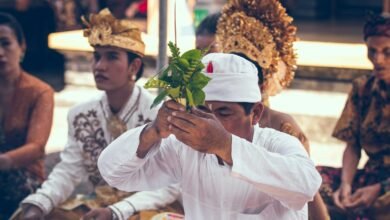
Indonesia is a diverse and welcoming country, and learning a few key phrases in Bahasa Indonesia can enhance your travel experience. Bahasa Indonesia, the official language, is widely spoken across the country. While English is understood in tourist areas, knowing some basics will help you navigate more confidently and connect with locals. Here’s a guide to essential Indonesian language tips and etiquette for travelers.
1. Essential Phrases
Knowing a few simple phrases can go a long way. Here are some common expressions you’ll find useful during your trip:
- Hello – Halo (ha-lo)
- Good Morning – Selamat Pagi (se-la-mat pa-gee)
- Good Evening – Selamat Sore (se-la-mat so-ray)
- How are you? – Apa Kabar? (ah-pa ka-bar)
- Thank you – Terima Kasih (te-ree-mah kah-see)
- Yes – Ya (yah)
- No – Tidak (tee-dahk)
- Excuse me/Sorry – Permisi (per-mee-see)
- Please – Tolong (toh-long)
- Goodbye – Selamat Tinggal (se-la-mat ting-gal)
These simple phrases can help you with greetings, gratitude, and basic communication in various situations, such as restaurants or shops.
2. Pronunciation Tips
- Vowels: Indonesian vowels are pronounced clearly and consistently. For example, a is like “ah” (as in father), e is like “uh” (as in butter), and i is like “ee” (as in see).
- Stress: Words are generally stressed on the second-to-last syllable, which makes Indonesian pronunciation straightforward compared to many other languages.
- Consonants: The “c” is pronounced as “ch” (as in chocolate), and “g” is always hard (as in go), even at the end of words.
3. Numbers and Counting
Numbers can be useful when ordering food, shopping, or negotiating prices. Here are a few to get you started:
- One – Satu (sa-too)
- Two – Dua (doo-ah)
- Three – Tiga (tee-gah)
- Five – Lima (lee-mah)
- Ten – Sepuluh (seh-poo-looh)
- Hundred – Seratus (seh-rah-toos)
4. Etiquette and Cultural Sensitivity
Understanding local customs and polite language forms can help you avoid misunderstandings and show respect to locals:
- Use “Pak” and “Bu” for respect: These are polite terms for addressing older men and women, respectively. For example, Pak Agus (Mr. Agus) or Bu Sari (Mrs. Sari).
- Addressing people properly: When meeting someone, a handshake is common, but it’s polite to greet with a slight bow of the head. Indonesian people may greet with a smile or a friendly selamat pagi.
- Respect for elders: Respect for older people is significant in Indonesian culture. Always address older individuals with Pak or Bu.
- Keep your voice soft: Indonesians tend to speak in a calm and polite tone. Avoid raising your voice, especially in public or formal situations.
- Be mindful of personal space: Physical contact is generally avoided between opposite genders unless closely related.
5. Negotiation and Shopping
Bargaining is common in markets and smaller shops. Here are some phrases that can help:
- How much is this? – Berapa harganya? (be-rah-pah har-gan-yah)
- Can you lower the price? – Bisa kurangin harga? (bee-sah koo-rah-ngin har-gah)
- Too expensive! – Terlalu mahal! (ter-lah-loo mah-hal)
- I want to buy this – Saya mau beli ini (sah-yah mao beh-lee ee-nee)
6. Common Mistakes to Avoid
- “Sama-sama”: While terima kasih means thank you, sama-sama means “you’re welcome” or “it’s nothing.” It’s important to understand this cultural response.
- Directness: Indonesian communication tends to be indirect. Be mindful not to be too blunt when giving feedback or declining offers. Instead of saying “no,” you might hear belum (not yet) or tidak tahu (don’t know) to soften the rejection.
7. Resources for Learning
If you want to expand your Indonesian vocabulary further or practice pronunciation, there are plenty of language resources available, such as:
- Language Apps: Duolingo, Babbel, and Memrise all offer Indonesian courses.
- Online Language Exchange: Platforms like italki allow you to practice with native speakers.
- Phrasebooks: Carrying a small Indonesian phrasebook can be helpful when you’re traveling to less touristy areas.
Tags
Bahasa Indonesia basics bargaining in Indonesia cultural etiquette in Indonesia essential Indonesian phrases how to speak Bahasa Indonesia language resources Indonesia Travel Guide Indonesian etiquette Indonesian for tourists Indonesian greetings Indonesian language tips Indonesian phrases for travelers Indonesian pronunciation Indonesian pronunciation guide Indonesian vocabulary language tips Indonesia learn Bahasa Indonesia shopping in Indonesia travel in Indonesia travel phrases Indonesia traveling in Bali
URL Copied



